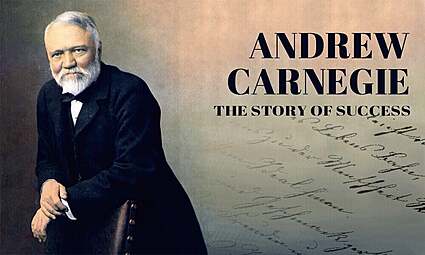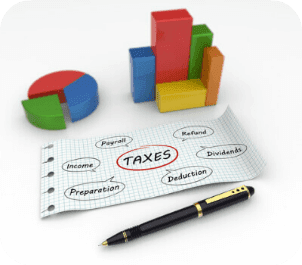Great BLOGS Around the Web to Help You Succeed

Andrew Carnegie is one of the most influential philanthropists in American history and laid down the foundation for this nation's success in the world of business. Mr. Carnegie founded one of the world's greatest research universities and helped build almost 3,000 public libraries in hopes it may lead to similar benefits to others that made him one of the wealthiest individuals in history.
Like Mr. Carnegie, Alto CPA Group, LLC values your success whether you are an individual that is part of a bigger picture or a business leader providing opportunities for others. We hope you find real value in the sources below which includes tips, various topics, terminology and our favorite Blogs from from other sites. Make sure to come back often to find new material.
Disclaimer: Any tax, accounting, business and general advice in this communication or throughout our website, including links, attachments and enclosures, is not intended to be an in-depth analysis of specific issues, nor a substitute for a formal opinion, nor is it intended to avoid tax-related penalties. If needed, we would be pleased to perform research for you and provide you with a detailed written analysis through an official engagement. We would define the scope and limits of your request for consultation services in a separate engagement letter. Please read our disclaimers page ...disclaimers page ...



Small Business Administration (SBA) Blog
SBA is a great source for all business owners featuring a great Blog and exceptional resources. Link to Blog...
Small Business Trends
While this is not an official Blog, the small business trend website covers marketing, management, technology, finance and advice. They are also a great resource site for small businesses. Link to Blog...
All Business
Also, not a Blog, All Business covers marketing, strategy, financial management and more. You get "how to's", analysis, and commentary. Link to Blog...
Entrepreneur
Entrepreneur is another site that is not a Blog with exceptional small business advice and tips. Link to Blog...
Zenbusiness
Articles are written by successful and popular business owners. You will find great articles on how to start, grow and succeed in your business. One of our favorites. Link to Blog...
Manta
Manta provides great articles and great resources for small businesses. You will find tips, news, webinars, free courses (called academy) and help with marketing your business online. Link to Blog...
EO network Blog
EO stands for Entrepreneurs’ Organization – a well-known organization offering educational opportunities to business owners. In their blog, they provide solid insights priceless insights across a long list of topics and include posts from well-respected business bloggers. We consider this blog in the top 3 of finest on business. Link to Blog...
Noobpreneur
The Noobpreneur blog offers great tips and ideas for small business. You will find trends and insights by industry from business owners and expert commentary. Link to Blog...
CorpNet
CorpNet is a leader in the entity formation business and their learning center is filled with great articles and resources. Link to their Learning Center...
Ideas Plus Business
Ideas Plus Business is an excellent business resource for entrepreneurs and startups. Articles covers many areas of business including finance, marketing, and technology. Link to Blog...
Fundera
Fundera connects small businesses directly with lenders that provide the best deals. In addition to offering a variety of lending services, their Blog covers a wide range of advice on credit, borrowing and growing your business. Since we have partnered with Fundera, we have tools to help our clients successfully find working capital, expedite the loan process and we pass on discounts on loan fees. Link to Blog...

Tax Buzz Blog
Tax Buzz goes beyond taxes and covers business topics as well. Great Tax tips. Link to Blog...
Big Ideas for Small Business Blog
One of the best blogs on personal and small business taxes. Our favorite. Link to Blog...
Intuit TurboTax Blog
TurboTax Blog from Intuit provides an easy to read way to keep up with the basics of tax preparation and news. You will find very useful tax tips as well. Link to Blog...
Tax Policy Center Blog
Tax Policy Center provides in-depth guides on U.S. tax policy. The posts they add are very informative and written by veteran professionals. Link to Blog...



Vend Blog
Vend is a retail management cloud software provider. Not only is their Blog full of great content, their resources are excellent for retail businesses to use. Link to Blog...
Retail Minded Blog
Retail Minded covers all selling channels mainly for independent retailers and small business owners. You will also find great resources. Link to Blog...
RetailWire Blog
As RetailWire puts it, articles are selected based on “timely topics worthy of commentary". Get the latest and greatest and be sure to check out their Retail Marketing page. Link to Blog...
SnapRetail Blog
Mainly focused on Retail Marketing, SnapRetail also provides great tips for small business retailers. Link to Blog...
Shopify
Shopify has one of the best eCommerce Blogs and you will usually find a new post every day. Each article provides an in-depth look of the topic at hand. You will find the posts interesting and educational. Link to Blog...



Zendesk Blog
The Zendesk blog is an excellent resource for providing great customer service. Posts discuss how to collect customer feedback and what skills are needed to provide great customer service. Link to site...
Effortless HR Blog
Effortless HR Blog provides content from the people side of the business. You will find articles on compensation, customer service, hiring, labor laws and employee training. Link to site...
HubSpot Blog
One of our favorites, HubSpot is an inbound marketing company and they produce blogs on Marketing, Sales and Customer Success. They love writing so you may see multiple posts every day and they have thousands in their library you will find useful. Link to site...
Close.IO Blog
Close.io is a CRM software business for small to medium sized businesses. Their CRM blog focuses on sales topics with videos, tutorials, case studies, and guides. You will find great sales strategies along with tips, techniques and templates on sales. Link to site...
Gusto Blog
Gusto is an easy to use, integrated payroll, benefits, and HR platform we are proud to be partners with. Gusto serves more than 60,000 businesses nationwide and process tens of billions of dollars of payroll each year. Gusto's blog covers just about everything for small businesses and will keep you abreast of important changes and deadlines in the payroll and HR world. Link to site...
QuickBooks Blog
Who hasn't heard of QuickBooks? The QuickBooks Blog covers more than just accounting and taxes. You will find QuickBooks articles well-written and relevant to your business. Link to site...
Miscellaneous Articles

These articles have been written by the staff of Alto CPA Group, LLC. Our goal is to continuously add new topics and update or remove earlier ones. Each topic and article is dated. We hope this will help you personally and professionally. Respectfully, Alto CPA Group, LLC.



Only 50% of workers have retirement savings, and the average for families is around $17,000. Only 50% of small business employees are not even provided a retirement plan to invest in.
Offering a 401(k) plan sends a message to your employees that you care about them and you want to help them invest in their future. There are many different options that can be a little complicated and have complex fees attached to them.
How do you establish a 401(k).
This IRS link covers what you need to do to set up a 401(k) plan. We will cover the basics.
1. Choose a plan type that’s best for your business and its employees.
A big consideration is how you want to prepare for annual nondiscrimination testing to ensure your plan is as accessible to entry-level employees as they are with executives.
Plans that require employers to contributions to employees’ 401(k) accounts have an easier time passing the tests, and in some cases may even be exempt from testing. Although plans that don’t require employers to contribute cost less, they may be at risk of failing.
Here are 3 popular plan types:Traditional 401(k):
Traditional 401(k): Employers can choose a not contributing or matching a portion of the employee’s investments. A vesting period can be set up. Traditional plans must pass nondiscrimination testing every year.
Safe Harbor 401(k): Like a traditional plan, employers are required to make contributions above and beyond what participants choose to invest. The contributions you offer must be a certain amount (at least 3% of an employee’s taxable wages) and vest immediately. By making these contributions, a plan is exempt from nondiscrimination testing.
SIMPLE: Savings Incentive Match Plan (SIMPLE) for Employees, is for businesses with less than 100 employees. Like Safe Harbor plans, SIMPLE plans require employers to make contributions to their participants’ 401(k) accounts that vest immediately and are exempt from nondiscrimination testing.
There are very specific rules about how contributions are structured in these plans.
2. Adopt a written plan.
You must adopt a written document that "serves as the foundation for day-to-day plan operations." That is according to the IRS. Your 401(k)-plan administrator handles this for you.
3. Arrange a trust fund for the plan’s assets.
A plan’s assets must be held in trust to ensure they are used to benefit plan participants and their beneficiaries. They must be monitored by a designated trustee. This trustee is responsible for collecting the contributions, investing them, and issuing distributions.
4. Develop a record-keeping system.
This helps you keep track of contributions, earnings and losses, plan investments, expenses, and benefit distributions from participants’ accounts. If you have a plan administrator, they help with record-keeping. The preparation of the plan’s annual reports and business tax returns will be difficult if record-keeping is a mess.
5. Provide plan information to participants.
As a plan sponsor, you are required to notify all eligible employees and beneficiaries about the 401(k) plans, in addition to any updates to it. A summary plan description needs to be circulated on a recurring basis, detailing information about your plan and its benefits, along with other documents related to fees.
6. Integrate a 401(k) plan with payroll.
Choose a payroll provider that integrates directly with your 401(k) plans.
The integration transfers information from Payroll to the 401(k) plans, making contributions automatic while managing employee enrollment. The 401(k) plan sends payroll, contribution reports every pay period.Learn how we can help you and your
employees save for a better retirement.

How to Establish Business Credit as a Startup
Building and establishing a business credit rating at startup is essential to building a successful business. For one, if you ever need a small-business loan or line of credit in the future, your strong personal credit won’t help you much, but a strong business credit rating will. In addition, a strong business credit rating will help you get larger amounts of financing at favorable rates and may help to lower insurance policy rates. Establishing a strong credit rating for your business with a positive business credit history should be on your list of things to do right from the start.
Business credit scores work a little differently from personal credit scores and they vary across the different credit bureaus. The Dun & Bradstreet business credit score ranges from 1 to 100 and the higher the score, the more your business is likely to pay back its debt on time (maintain a score of 80 or higher) . It’s important to keep an eye on your credit by checking your credit file to see if there are errors in your business credit history and to see how your credit scores are trending. Many suppliers and lenders use D&B business credit scores so as a startup, you should apply for an account here.
Credit bureaus Experian and Equifax build business credit files by pulling public record data like court documents, business filings, and collection data.
Other business credit scores: FICO®SBSS scores range from 0-300 (maintain a score of 160 or higher), Equifax scores range from 0-100 (maintain a score of 90 or higher) and Intelliscore by Experian score ranges from 0-100 (maintain a score of 75 or higher). Note: FICO®SBSS scores include data from personal and business credit.
You can get a get a free business credit report summary from Nav for both Experian and D&B. These 2 business credit services will eventually cost you money. With credit.net you can get a free 7 day trial (no credit card required) of their reporting services including 7 free business credit reports. You can also try Creditsafe. In order for you to get a clear picture of your business credit rating, you will need to pay a fee. Buying a business credit report every 6 month’s for your business should be sufficient.
Building Your Business Credit
Entity Formation
Since business credit history is separate from personal credit history, incorporate your business (LLC. S-Corp, C-Corp, etc. etc.), register your business, and get an employer identification number (EIN). It is very important to keep your business and personal finances separate so get a business checking account, and apply for a business credit card that reports to business credit bureaus. Your business credit report only includes debts that are under your company’s name, address and employer identification number (EIN). Contact us below and we will help you determine the best entity structure for your startup and get you started.
Get Yourself a Business Credit Card, and a Line of Credit
A business credit card is needed whether you want one or not. Stay away from using cash to purchase anything for your business as it is a recordkeeping nightmare. As for a credit line, they come in handy during cash crunches, especially when it is time to pay your employees and your bank balance is low. Any business can fail quickly if they don’t manage their cash properly and credit lines are necessary to fill in the gaps. Using both your credit card and line of credit will help you improve your business credit score as long as you pay at least the minimum amount due before the the due date. Paying more than the minimum due is a wise choice and paying them off in full each month is even a better choice. In addition, if your personal credit score is higher than 660, you may qualify for the best reward cards with no annual fees along with lower interest rates. If you have a difficult time qualifying for a business credit card, try getting a secured business credit card which requires you to fund the account. Similar to a debit card, except you get to build up your credit score. Note: SBA loans, term loans, and other loans usually requires you to be in business at least 2 years before being eligible.
Get a Dedicated Phone Line for Your Business
Although a dedicated business address helps, a dedicated phone number will further separate your existence from your business so do not use your personal cell phone number. At GoDaddy.com, you can get your own 800 number for as low as $12.99 a month that links to your cell phone provider. You can also sign up for a business email address at GoDaddy.com for as little as $2.99 a month. You do need a domain for the email subscription.
Your Suppliers, Vendors, and Lenders
Your business credit score will increase as you pay suppliers, vendors, and lenders if they report good payments so develop solid relationships with all of them. Ask your current and future suppliers, vendors, and lenders if they report to the business credit agencies. If they don’t, kindly ask them to as there is no cost for them to report to the credit bureaus.
Keep a Lid on Borrowing
It takes time to build up your credit rating so take it slow. You want to see your business credit score improve gradually and you don’t want your business credit rating to suffer by applying for too many credit accounts in a short time frame. In addition, too much debt will not only kill your business, it will damage your business credit score.
Manage your business credit effectively and you will thank yourself later. Remember that a long history of business credit, the type of credit accounts you use, and your payment behaviors impact your credit score. Paying early with payment amounts greater than the minimum, shows you are a responsible borrower. Make sure your vendors report to business credit reporting agencies, and pay them early.
Learn how we can help you start your business
Depreciation
Fixed assets like cars, computers, furniture, equipment, etc. etc., ages and loses it's value over time. Depreciation is the allocation of the value of the fixed asset over it's useful life. This allocation or write-off is taken as an expense in each accounting period. Depreciation is also an allowable deduction for tax purposes.
Depreciation on a tax return
You can choose to deduct the entire cost of a fixed asset at the time of purchase as Bonus depreciation Section 179 deduction or you can depreciate the fixed asset over it's useful life by using the straight line method of depreciation or the Modified Accelerated Cost Recovery System (MACRS) method. Most assets are depreciated using MACRS or taking a Section 179 deduction where . You can deduct a substantial amount in the year the fixed asset is purchased. You can use one method of depreciation for tax purposes and a different method for accounting purposes. This causes differences in expenses.
The four depreciation methods allowed by the IRS are:
- MACRS — You can write off more depreciation in an asset's early years and less in the later years.
- Straight line depreciation — Mainly used for assets like software.
- Section 179 deduction
- Bonus depreciation
Accounting Depreciation
There are four allowable depreciation methods for accounting purposes according to Generally Accepted Accounting Principles (GAAP) guidelines:
- Straight line — Fixed asset costs are depreciated evenly over it's useful life.
- Double declining balance (DDB) — This method accelerates depreciation in the first few years and slows down in the later years.
- Sum of the years digits (SYD) — This method also accelerates depreciation in the first few years and slows down in the later years. SYD depreciates assets slightly slower than DDB does.
Units of production — Often used in manufacturing, this method depreciates assets based on usage or output rather than years in service.
Consult with a financial professional when deciding which depreciation method is right for your business.
